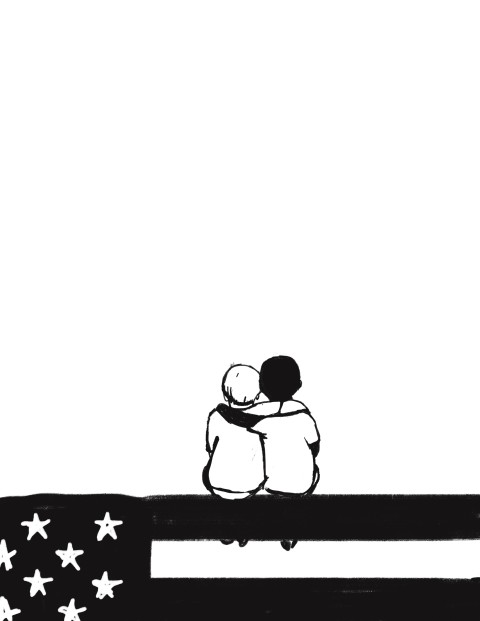I shouldn't have to be so scared
In 34 years in this country, I've experienced racism. But I've never felt like I feel this week.

Four months ago I became a citizen of the United States of America. In a crowded room in Charleston, South Carolina, I stood with more than two dozen other Americans-elect, representing more countries than I expected, and repeated the oath of allegiance. The ceremony was led by an unmemorable man in his 30s, who looked comfortable as a bureaucrat. He was cheerful. I believed his smile, even as he stumbled through our names when each of us was called forward to receive our certificate of citizenship.
I’ve lived in this country for 34 years. I pledged allegiance to the flag every day at the public schools I attended. I’ve shot bottle rockets at friends while drinking Budweiser on the fourth of July. On election days, I've been especially envious of my wife, who was born in West Virginia, because she got to vote even though I followed politics with much more fervor. I’ve traveled all over the country, by car and plane. I’m Ethiopian by birth but this country has been my home for 95 percent of my life.
And so I expected the citizenship ceremony to be anticlimactic and overwrought with contrived moments intended to evoke a patriotism I already possessed. I was wrong.
My two children cut class to come along for the civics lesson. My wife skipped work to join me. As a preacher and pastor I’m used to watching them watch me speak in public. But with one hand up and the corner of one eye watching my son, daughter, and wife, I didn’t expect my stomach to flip and my hand to shake and my voice to drop into a whisper. They were proud of me, and I was grateful that the fear of being separated from them was over. I knew, in that moment, what it was when I heard people say, “I’m proud to be an American.”
Thirty-four years ago this country welcomed me, my mother, and my father, when we were not welcome in our own. I owe a debt that I cannot pay. There are too many strangers, too many institutions, too many public school teachers, too many houses of worship, too many instances when we could have been ignored but instead got help. In the oath of allegiance, I promised to defend the U.S. Constitution. I intend to fulfill that oath, just like all the Americans in my life story who did so when they embodied the Constitution’s bias toward equality and inclusion by welcoming my family and me.
I did not anticipate having to fulfill the demands of the oath so soon.
Maybe you knew that it is apparently acceptable for the president of the United States to make some of the citizens he serves scared to be here. I did not.
As a black co-pastor of an almost all white Presbyterian (USA) church, who married a white girl from West Virginia and received two degrees from nearly all-white liberal arts colleges in the South, I’ve experienced racism. But I've never been scared before. I'm a recipient of a not-so-special scholarship reserved for the poor immigrant kid stuck (after completing ESL) in classes full of not-so-brown kids with above-average standardized test scores, kids who got their initials monogrammed on L.L. Bean backpacks and were nice enough to not call you racist names, at least not to your face. I’ve experienced racism before, but I never got scared.
But it’s now, because our president normalized racism in two unimaginable statements about Charlottesville, that I am scared. I am scared for my children, my wife, myself, the church I serve, and the country I now call my own. I’m scared of what comes next. I’m scared that the Constitution we pledged to protect may not be capable of protecting us.





